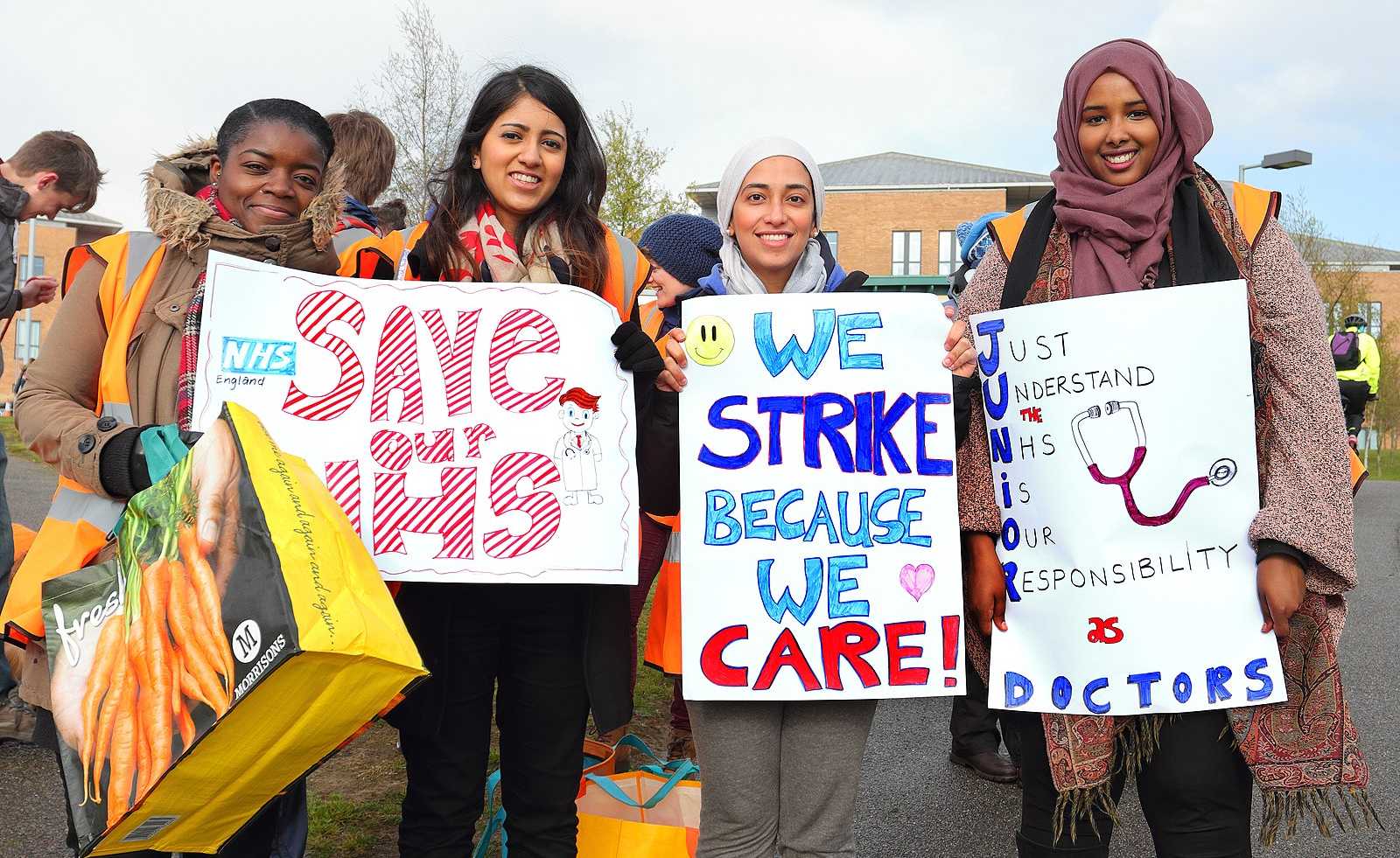 Junior Doctors on strike. Photo: Wikimedia Creative Commons
Junior Doctors on strike. Photo: Wikimedia Creative Commons
A health professional describes the chaos in the NHS and reports that regulators accept staff won’t be able to do their jobs this winter
The National Health Service is heading towards a winter crisis of enormous magnitude; decades of underfunding in the health service is being compounded by consistent Covid hospitalisations of around 7,000, set against a backdrop of a pay scale too low to recruit and retain qualified healthcare staff. The Royal College of Nursing have voted overwhelmingly in favour of industrial action, and their colleagues in Unison, Unite, GMB and BMA are hoping for similar results.
In the midst of this approaching storm, professional regulators the Nursing and Midwifery Council (NMC) and Care Quality Commission (CQC) have released a joint statement to health and social care professionals. In a shocking open letter, both regulators have acknowledged that the coming crisis will be so challenging that professionals are unlikely to be able to maintain their standards of practice. The regulators will be “taking into account local realities and the need at times to adapt practice at times of significantly increased national pressure,” and acknowledge that professionals “may need to depart from established procedures to care for people”.
The regulators go on to state
“We expect employers, educational supervisors, professional bodies, national health and social care organisations to be flexible in recognition of the challenging and changing landscape we are likely to face.”
To receive this as a qualified healthcare professional was deeply distressing. I know that my colleagues and I already spend sleepless nights worrying that we are not able to give the standard of care we want to. We have posts that have laid vacant for years, waiting lists so long that we consistently have to report the level of clinical harm people have endured whilst waiting to see a professional, and numerous distressing reports of failures in care across our borough.
These challenges are not due to circumstances outside the public sector’s control. Health and social care unions have warned for years that underfunding in training, removal of bursaries, and a consistent real-terms pay cut for staff will lead to an avoidable crisis of recruitment and retention. Campaigners have been highlighting the impact this will have on patients and staff, the avoidable deaths such a crisis will lead to. The government has chosen, time and time again, to ignore these warnings; and now they paint healthcare workers as greedy and uncouth for daring to talk about pay and conditions.
We are already working at breaking point; it is too late in the game for our regulators to acknowledge this. What we need from our regulatory bodies is a commitment to supporting our struggle for improved pay and conditions – not a mealy-mouthed acceptance that we have no choice but to let our professional standards slip.
In one of the most developed nations in the world, we are heading towards a winter where thousands of people will die on trolleys, in ambulances, and in the back of taxis drafted in to relieve the pressures on the ambulance service. Elderly people will be left in pools of their own urine on the floor for hours or even days, because ambulances are needed elsewhere. Doctors and nurses will have to make horrific decisions about who is most in need of occupying an A&E bed, or a mental health inpatient service. People will die as a result of being prematurely discharged from these services. And the most sickening part is that this crisis is entirely avoidable, and always has been.
The government will lay the blame for this crisis at the feet of the general public, for making ‘unecessary’ A&E visits; but people unable to get a GP appointment often have no choice other than to utilise emergency services. They will tell us the NHS is ‘inefficient’ and in need of reform, and that it’s the fault of healthcare professionals for working in the wrong way; but any healthcare professional will tell you the greatest waste of time in recent years has been the transition to Integrated Care Boards, a vanity project that has only served to make life more difficult for practitioners on the ground. They will tell us that Covid has pushed the NHS over its limit, whilst they encouraged the spread of Covid by removing sick pay protection, ending free testing and selling off Track and Trace to their rich friends.
The truth is that with a pay rise for NHS staff that takes account of years of underfunding, as well as the high level of risk that we undertake in our work, much of this crisis could be avoided. Staff would be more likely to stay in the health service, rather than leaving in droves for better-paid work with less of an emotional burden. Staff would be able to devote their mental energy to their job, rather than worrying about how they are going to put food on the table after a 13-hour shift. We are not asking for the moon on a stick; simply for the government to value our work properly and take steps to stop a completely avoidable slew of unnecessary deaths over the coming months.
We don’t want to accept that our professional standards may have to slip; we want to fight for a health service where they don’t have to.
Fund the fightback
We urgently need stronger socialist organisation to push for the widest possible resistance and put the case for change. Please donate generously to this year’s Counterfire appeal and help us meet our £25,000 target as fast as possible.

